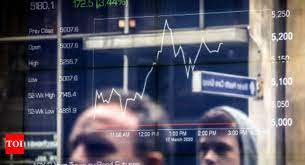As investors watch to see if the conflict draws in additional nations with the potential to push up oil prices further and inflict a major blow to the world economy, attention has been drawn to mounting geopolitical concerns for financial markets.
As its troops prepared for a ground invasion on the Hamas-controlled Gaza Strip in reprisal for escalating strikes by the Palestinian terrorist group, Israel declared on Sunday that it will continue to permit Gazans to flee south.
As investors factored in the likelihood of a larger Middle East conflict, oil prices increased by about 6% on Friday. When oil begins trading in Asia later on Sunday, that will likely be the first sign of how people will react to weekend events.
"It looks like we’re headed for a massive ground invasion of Gaza and a large-scale loss of life," said Ben Cahill, senior fellow in the Energy Security and Climate Change Program at the Center for Strategic and International Studies (CSIS). "Anytime you have a conflict of this scale, you will have a market reaction."
Though Israel's currency, the shekel, suffered a significant knock, market reaction over the previous week has been comparatively modest.
"I have no clue whether markets will remain relatively well behaved," said Erik Nielsen, group chief economics advisor at UniCredit. "It almost certainly depends on whether this latest conflict remains localized or whether it escalates into a broader Middle Eastern war."
On Friday, the S&P 500 decreased 0.5%. With gold rising by more than 3% on Friday and the US dollar reaching a one-week high, safe-haven assets saw purchasing.
According to Bernard Baumohl, chief global economist of The Economic Outlook Group in Princeton, New Jersey, an escalating conflict would also likely lead to inflation and, as a result, an increase in interest rates globally.
However, while other nations' rates and inflation will probably increase in this worst-case scenario, Baumohl observed that the United States may be an exception as overseas investors pour money into what they see as a safe haven during a world war.
"Interest rates could go down," he said. "Expect the dollar to strengthen."
Economists in Europe said the threshold for another rate increase by the European Central Bank was high.
Since Russia's invasion of Ukraine last year, the conflict between Israel and the Islamist group Hamas has put oil markets at danger on a geopolitical scale.
"If the Ukraine war taught us anything, it's not to underestimate the effect of geopolitics," Nomura European economist George Moran said on the bank's week ahead podcast.
As seen by recent events like Chevron stopping natural gas exports through a significant undersea pipeline between Israel and Egypt, other energy markets may be disrupted.
Analysts stated that increasing oil prices are unlikely to have a big influence on consumer spending or petrol prices in the United States.
(Source:www.cbc.ca)
As its troops prepared for a ground invasion on the Hamas-controlled Gaza Strip in reprisal for escalating strikes by the Palestinian terrorist group, Israel declared on Sunday that it will continue to permit Gazans to flee south.
As investors factored in the likelihood of a larger Middle East conflict, oil prices increased by about 6% on Friday. When oil begins trading in Asia later on Sunday, that will likely be the first sign of how people will react to weekend events.
"It looks like we’re headed for a massive ground invasion of Gaza and a large-scale loss of life," said Ben Cahill, senior fellow in the Energy Security and Climate Change Program at the Center for Strategic and International Studies (CSIS). "Anytime you have a conflict of this scale, you will have a market reaction."
Though Israel's currency, the shekel, suffered a significant knock, market reaction over the previous week has been comparatively modest.
"I have no clue whether markets will remain relatively well behaved," said Erik Nielsen, group chief economics advisor at UniCredit. "It almost certainly depends on whether this latest conflict remains localized or whether it escalates into a broader Middle Eastern war."
On Friday, the S&P 500 decreased 0.5%. With gold rising by more than 3% on Friday and the US dollar reaching a one-week high, safe-haven assets saw purchasing.
According to Bernard Baumohl, chief global economist of The Economic Outlook Group in Princeton, New Jersey, an escalating conflict would also likely lead to inflation and, as a result, an increase in interest rates globally.
However, while other nations' rates and inflation will probably increase in this worst-case scenario, Baumohl observed that the United States may be an exception as overseas investors pour money into what they see as a safe haven during a world war.
"Interest rates could go down," he said. "Expect the dollar to strengthen."
Economists in Europe said the threshold for another rate increase by the European Central Bank was high.
Since Russia's invasion of Ukraine last year, the conflict between Israel and the Islamist group Hamas has put oil markets at danger on a geopolitical scale.
"If the Ukraine war taught us anything, it's not to underestimate the effect of geopolitics," Nomura European economist George Moran said on the bank's week ahead podcast.
As seen by recent events like Chevron stopping natural gas exports through a significant undersea pipeline between Israel and Egypt, other energy markets may be disrupted.
Analysts stated that increasing oil prices are unlikely to have a big influence on consumer spending or petrol prices in the United States.
(Source:www.cbc.ca)






